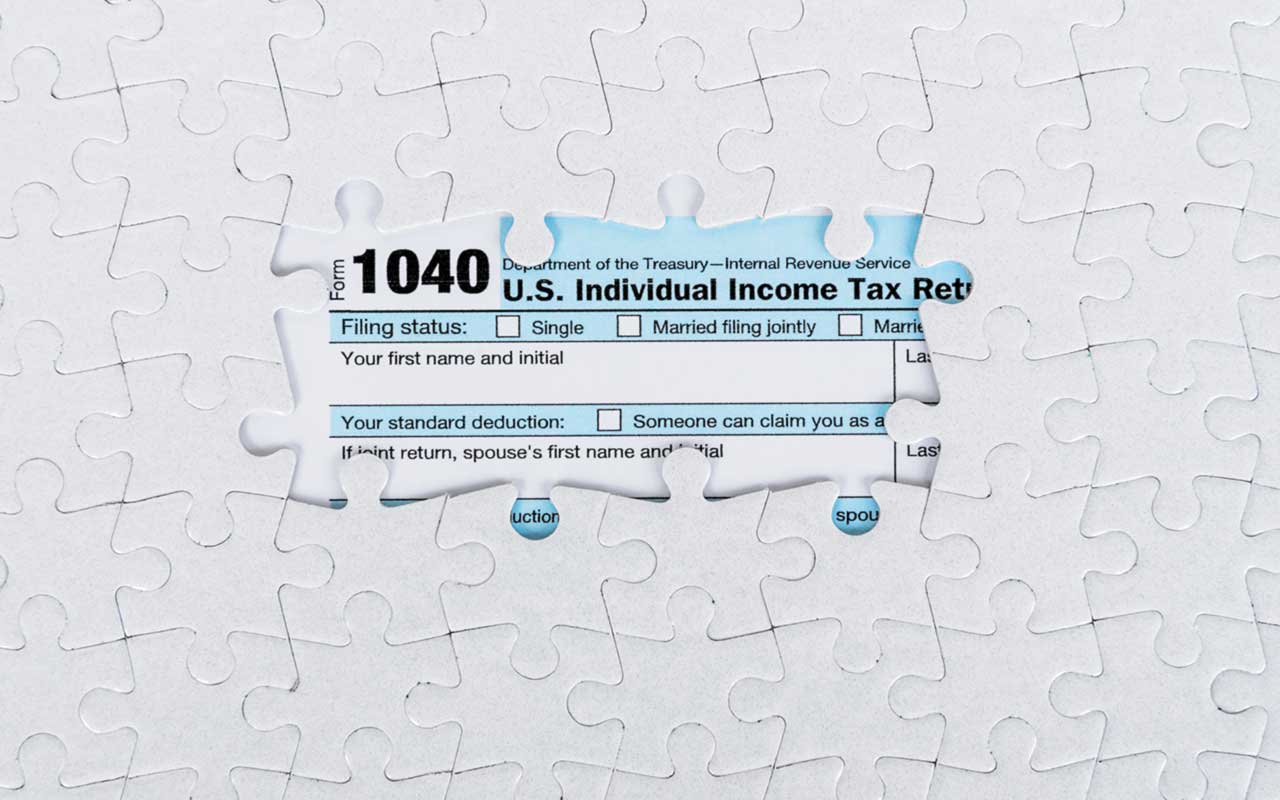Still Need to File Your Taxes? The Deadline Is July 15
H&R Block's chief tax officer Kathy Pickering joins our Your Money's Worth podcast to offer advice for last-minute tax filers. Also, our hosts Ryan Ermey and Sandy Block break down the latest news on stimulus checks.

Profit and prosper with the best of Kiplinger's advice on investing, taxes, retirement, personal finance and much more. Delivered daily. Enter your email in the box and click Sign Me Up.
You are now subscribed
Your newsletter sign-up was successful
Want to add more newsletters?

Delivered daily
Kiplinger Today
Profit and prosper with the best of Kiplinger's advice on investing, taxes, retirement, personal finance and much more delivered daily. Smart money moves start here.

Sent five days a week
Kiplinger A Step Ahead
Get practical help to make better financial decisions in your everyday life, from spending to savings on top deals.

Delivered daily
Kiplinger Closing Bell
Get today's biggest financial and investing headlines delivered to your inbox every day the U.S. stock market is open.

Sent twice a week
Kiplinger Adviser Intel
Financial pros across the country share best practices and fresh tactics to preserve and grow your wealth.

Delivered weekly
Kiplinger Tax Tips
Trim your federal and state tax bills with practical tax-planning and tax-cutting strategies.

Sent twice a week
Kiplinger Retirement Tips
Your twice-a-week guide to planning and enjoying a financially secure and richly rewarding retirement

Sent bimonthly.
Kiplinger Adviser Angle
Insights for advisers, wealth managers and other financial professionals.

Sent twice a week
Kiplinger Investing Weekly
Your twice-a-week roundup of promising stocks, funds, companies and industries you should consider, ones you should avoid, and why.

Sent weekly for six weeks
Kiplinger Invest for Retirement
Your step-by-step six-part series on how to invest for retirement, from devising a successful strategy to exactly which investments to choose.
Ryan Ermey: We know that Tax Day in July isn't quite as appealing as Christmas in July. Nevertheless, if you need tax advice before the July 15th deadline, we've got you covered. H&R Block chief tax officer Kathy Pickering joins the show to talk last-minute moves in our main segment.
- Episode Length: 00:35:07
- Listen to previous Your Money's Worth episodes
- SUBSCRIBE: Apple Google Play Spotify Overcast RSS
Ryan Ermey: On today's show, Sandy and I give yet another update on stimulus payments and I answer a reader question about target date funds. That's all ahead on this episode of Your Money's Worth. Stick around.
Ryan Ermey: Welcome to Your Money's Worth. I'm Kiplinger's associate editor Ryan Ermey, joined by senior editor Sandy Block. Sandy, how are you?
From just $107.88 $24.99 for Kiplinger Personal Finance
Become a smarter, better informed investor. Subscribe from just $107.88 $24.99, plus get up to 4 Special Issues

Sign up for Kiplinger’s Free Newsletters
Profit and prosper with the best of expert advice on investing, taxes, retirement, personal finance and more - straight to your e-mail.
Profit and prosper with the best of expert advice - straight to your e-mail.
Sandy Block: I'm good, Ryan.
Ryan Ermey: I'm glad to hear it. Last episode, we mentioned that we would keep the dear listener abreast of any new news with the stimulus checks. We didn't necessarily think it was going to be so soon, but we have new news.
Sandy Block: Yes, we do. Honestly, Ryan, we're really not trying to get more . . . I don't know, the podcast term for getting more clicks. But it certainly appears that the segments we've done on stimulus or the potential for stimulus have done very well. But this is real news. We're not just trolling here.
Ryan Ermey: Not only that, but people genuinely want to know when and how they're getting their money. I don't blame them-
Sandy Block: Well, that's right.
Ryan Ermey: . . . for tuning in. Many Americans thought a prepaid debit card that they received was a scam or junk mail, and many, many people threw them out. So the Treasury is now sending out letters, urging people to activate the cards. The letter also tells people how to collect their money if they tossed the payment out by mistake.
Sandy Block: Right. Yeah, you're getting more mail from Treasury, because you really haven't gotten enough. So there's always the possibility that people will think this one is a scam too. But the National Consumer Law Center has some nice tips on what this letter will look like. Unlike-
Ryan Ermey: Yeah, they got the preview.
Sandy Block: That's right. Unlike the debit cards, which I've got to say -- I got one -- really did look sketchy. This envelope will carry the Treasury logo and the notice, "Not a bill or an advertisement. Important information about your economic impact payment." It won't say, "Don't throw this away," but it almost does.
Sandy Block: The return address . . . I always think this is interesting where the Feds are. The return address will say: Economic Impact Payment Card, Post Office Box 247022, Omaha, Nebraska, with a zip code. It will have this wording, "The EIP card program is sponsored by the U.S. Department of Treasury." Finally, you'll see instructions that tell you to call customer service and give you a number for it, 800-240-8100, to report if your card was lost or stolen or thrown away. There is no fee for the first replacement card.
Ryan Ermey: A hat tip to Michelle Singletary writing for the Washington Post on that piece of news. We'd also like to let people know, Sandy, that there are tax implications for your economic impact payment, and you should be hanging on to a particular notice.
Sandy Block: Right. But this is more mail. People who receive the stimulus payment this year should keep "Notice 1444, Your Economic Impact Payment" with their tax records. This notice will provide information about the amount that you received, how it was made and how to report if your payment wasn't received. It says that the IRS mails this notice to each recipient's last known address within 15 days after the payment goes out.
Sandy Block: Ryan, do you remember getting one of these? Because you got your payment.
Ryan Ermey: I don't. Yeah, I did. I got my payment via direct deposit. I remember getting a letter signed by our president that I was going to be getting one. I don't think it was an official tax document. Put it that way.
Sandy Block: I think I got one. Here's why this is important. If you get this form, file it with all the other things that you should be filing to support your 2020 tax return. Your W-2s, your 1099s and all that stuff. This is a new form, but you will want to have it on hand when you file your tax returns. So don't throw this one away.
Ryan Ermey: If indeed you did get it. As a general rule, Sandy, we recommend that people should hang on to tax forms for at least three years, right?
Sandy Block: Right. That's the amount of time that the IRS has to audit you. Unless it thinks you cheated, in which case it can audit you forever. Every time I write about how long you should keep tax returns, I get mail. There's a lot of debate. There's some thought that you should keep your actual tax return forever, just because you never know when you're going to need the information that's in there. I don't think you're going to need to keep this form forever. I think this is probably a one-time thing. But definitely keep it until next year.
Ryan Ermey: All right, so that's the latest and greatest on the stimulus payments. We will have more as it comes up. We know that people care about this, especially folks who haven't received their payment yet or perhaps threw it in the garbage.
Ryan Ermey: We'll have up in the show notes instructions for recovering your payment in case you did indeed trash it. Stay tuned for all of Kiplinger's wonderful coverage of not only your taxes, but of the entire deal with any further economic stimuli that we might be receiving.
Ryan Ermey: If you're rushing to get your taxes done, don't overlook moves that could save you thousands. Stay tuned for our interview with Kathy Pickering next.
Ryan Ermey: We are back and we're here with Kathy Pickering. She is the chief tax officer at H&R Block. Kathy, thank you so much for coming on.
Kathy Pickering: Thank you so much for having me. It's such a pleasure.
Ryan Ermey: I guess the first question should really be why is it that we're talking about last-minute tax moves today, even though it is July?
Kathy Pickering: Isn't this the craziest thing ever? Who would have thought we'd be filing taxes in July. But, yes, because of the whole COVID-19 pandemic, back in March, the IRS announced that they were going to be extending both the filing and the payment deadlines from April 15th to July 15th. So now here we are, right around the corner is the filing deadline and everybody's finishing and wrapping up at the last minute for that July 15th deadline.
Ryan Ermey: When it comes to paying taxes, I think a lot of people are major procrastinators, so we're here talking about last-minute moves. Let's talk about extensions first.
Kathy Pickering: Sure.
Ryan Ermey: How can people go about getting one? What's the new deadline, if you do indeed get an extension? And does it actually mean that you can pay later?
Kathy Pickering: Yeah, those are fantastic questions. Let's break it down one at a time. Before we really start talking about the extensions, one thing that I wanted to highlight is that right now what we're seeing is that about half of the people that are still filing here for July 15th are getting refunds. That means they've let that money that they probably need very badly . . . they've left it sitting there for this whole time. So while I know that there's a lot of procrastinators, when you need money, you want to get on it and get that refund claimed as quickly as possible.
Kathy Pickering: Now, there are people that really just truly procrastinate for a whole host of reasons. Either they're just focused on other things. They need to wait on still more information or clarifying something. Or they just have other personal situations, understandably, with the whole pandemic, that they can't get it done. So you can file an extension. It's a pretty easy process. That will give you until October 15th to complete your tax filing. Very easy to do.
Kathy Pickering: That said, an extension to file is not an extension to pay. So even if you're going to file an extension, you need to estimate your taxes so that if you owe money, you can send in a payment in order to avoid getting the penalties and interest associated with that.
Sandy Block: Kathy, what should someone do if they go through that process, they realize that they do owe the IRS money and they don't have it? They can't afford to pay. What are their options then?
Kathy Pickering: So common. This happens. People get caught by surprise. Something changed in their situation and they just didn't understand it. A lot of people just freak out at that point in time. They're like, "Oh my gosh, I owe money. I'm not going to file." Right?
Kathy Pickering: What we like to say is first off, don't freak out, calm down, take a breath. It's most important to get your tax return filed or file an extension, because the failure to file penalty is 10 times higher than the failure to pay penalty. So if you find yourself in a situation where you owe some money and you just don't have it, you just can't pay, still file your tax return or file your extension.
Kathy Pickering: There are a number of options for people who can't make that tax payment. First thing is, and a lot of people just don't know this, that you don't have to make your payment on the same day that you're filing your taxes. So say you're ready to file today, but you get paid on Friday. You can set your payment date for July 15th and not have that money taken out of your bank account until then. So if you just need a week, you can set that payment date for the last day of the filing season, then you'll be fine.
Kathy Pickering: If you need a little bit more time than that, you can either set up a short-term extension to pay or an installment agreement. Do you need 120 days or less -- or do you need more time than that? In each case, there's a different process for just setting up the installment agreement. And of course, the IRS has to approve and agree to it, but they're generally very accommodating in those circumstances. The other option, of course, is that you can pay with a credit card.
Kathy Pickering: Now, what I would say is that each of these options has fees associated with it for setting it up and for how you're paying it. So if you're in this situation and you're a little bit confused or overwhelmed by it, this might be a good time to get some help so that somebody can help you navigate through. Here are the different options, here's the different fees associated with it, so that you can pick the right option for you.
Kathy Pickering: But don't worry about it. It happens to everybody. At some point in time, they get caught by surprise. There's a lot of different options for working it out.
Ryan Ermey: If people are rushing to get things done last minute here, what might be some common savings and deductions that maybe they're at risk at overlooking that should definitely be on their radar?
Kathy Pickering: Well, there are a number of things, especially when you're in a rush and you're in a hurry, you don't have the time to double-check things. What we're seeing is that a lot of people are eligible for the Earned Income Tax Credit. This is for lower income workers and it's one of the most frequently overlooked credits. About 20% of people who are eligible for it, don't claim it. That may be because they don't understand the rules. Sometimes if a grandparent is caring for a grandchild, they may just not even be aware that they were eligible for that deduction. And depending on your income and the number of children that you're caring for, that credit could be worth up to $6,500. So it's a pretty important one. We see a lot of people just either aren't aware of it or don't know the rules, and so they don't claim it.
Kathy Pickering: Another one that we see people really often overlook are the education benefits. It just really depends on what programs people are involved in. But that American Opportunity Credit, which is for the first four years of higher education, is worth up to $2,500 per student. So for families with multiple children going to school, that one can be really valuable.
Kathy Pickering: And then there's the Lifetime Learning Credit, which is up to $2,000. That can help reimburse you for job-related trainings or graduate school, different things like that. That's one that oftentimes people in a hurry may overlook.
Sandy Block: Kathy, I know our second grade teachers always told us to check our work, but a lot of us have outgrown that advice or didn't pay attention to it. In terms of your tax return, what are some common errors that we should avoid if we forget to check our work?
Kathy Pickering: I love that question. It's so perfect. We do. We see some very simple errors that can cause some costly delays.
Kathy Pickering: One thing that people get wrong is their filing status, just because they don't understand it. That can really affect which credits and deductions you're eligible for or the value of your standard deduction depending on the tax bracket.
Kathy Pickering: Say for example, very common situation, family with children is in the process of getting divorced. They may not be sure, should they be filing married, filing separate, because they're still married but they're not living together anymore. Or they might think, "Gosh, well, now we are separated, I'm going to claim as head of household." The rules here are very clear. If you're married on the 31st of December, if you're legally married, you claim as married filing joint. So it's important to get those right.
Kathy Pickering: However, in the example of grandparents taking care of their grandchildren and being the sole support for that child, they may qualify for head of household status.
Kathy Pickering: Those credits mean you might be leaving money. Or those filing statuses might mean you're leaving money on the table if you don't quite get it right.
Kathy Pickering: Then the other thing that we see a lot of is just clerical errors. People transpose numbers. If you don't get your Social Security number right or you inadvertently put the wrong Social Security number with the other child's name or something like that, that will cause a reject at the IRS. It's a very common reject, but you need to make sure that you're getting those absolutely right.
Kathy Pickering: And then sometimes people forget to include a W-2 or a 1099. Maybe if you had a little part-time job at the very beginning of the year and you just forgot about it. Those kinds of things, as the IRS is matching up the income that you're reporting with the income that they have on their records, if they don't match, then you're going to be getting a little notice from them saying, "Hey, things don't match up here. We're going to need a little bit more information." Nobody likes getting letters from the IRS, so it's important to get those things right.
Kathy Pickering: And then lastly, the other thing that we see is that sometimes people just don't file a tax return. They think, "I didn't make enough money," or, "I'm just too busy," or whatnot and they don't file a tax return. They could be leaving money on the table. The IRS tells us that it has roughly $1 billion in unclaimed refunds every year from people who didn't file a return. You can only go back three years. So right now coming up onto the July 15th deadline, people who didn't file a tax return in 2016, they've got just a few days left to file that return and claim that unclaimed refund if it's still up, if they haven't done so.
Ryan Ermey: Kathy, the last thing we wanted to ask you about, we often recommend at Kiplinger's, if someone has a particularly complicated tax situation that they might want to consider hiring a tax preparer, is it too late at this point to hire a preparer? If so, where should people go if they want some last-minute tax resources?
Kathy Pickering: That's a great question. For H&R Block, it is not too late. We certainly saw that once they announced the extension to the filing season, a lot of people, just at that point in time, stopped filing and started focusing on other issues, truly because they were concerned about other things.
Kathy Pickering: First and foremost, want to just really let everybody know that in our neighborhood offices, we're following all of the COVID protocols, social distancing, deep cleaning. So if you were concerned about going to an office because of that, know that we've got those protocols in place and people should feel comfortable doing that.
Kathy Pickering: But that said, some people still either just have concerns about it or the time is just not convenient. We have a couple other options, as well. We have a drop-off option. So people can, in effect, do a contactless visit where they can just drop off their documents, and the tax preparer can take care of it in the local office.
Kathy Pickering: And then finally, we also have virtual tax preparation options, as well. That's the ability to upload your documents electronically. It's a very easy process into a secure portal, and then a tax preparer will do your taxes for you, work with you to make sure that all your questions are answered and get that tax return filed for you. So there's plenty of options and there's still plenty of time for someone with a complex tax situation to get their tax return filed.
Kathy Pickering: The other thing that I would really highlight for people is this is a year like no other. So this is the perfect time to do a mid-year tax checkup for next year, as well. Some people are finding themselves in a situation that they've never been in before, like they're on unemployment, and a lot of people don't know that unemployment income is taxable. So it would be a good idea to kind of just do a quick checkup of where you are right now, because you've still got six months to make a correction -- if you're not having enough money withheld or if you're going to need to plan to set some money aside or those kinds of things. So there's still plenty of time to get your taxes prepared and this is also a great time to look forward for next year.
Ryan Ermey: Well, all fabulous advice, Kathy. If you're listening, go ahead and head to HRBlock.com to take a look at those resources that you talked about. Kathy, thank you so much for coming on.
Kathy Pickering: Thank you so much for having me. Really appreciate it.
Ryan Ermey: After the break, I tell you which target date fund might be right for you. Be right back.
Ryan Ermey: We are back. Before we go, Sandy and I are going to delve back in to our reader mailbag for a question, Sandy, that I'm excited to have received and excited to answer.
Sandy Block: Yes, go.
Ryan Ermey: Jamie writes, "Hello, what are some top target funds worth investing in for a 30-year-old? Just started to invest recently in ETFs. Have one target fund and one target index for 2055." I asked Jamie, "Send me the symbols for what you're investing in," because I wasn't exactly sure what he meant. So what he holds is Schwab Target 2055 (SWORX). He's also invested in Schwab Target 2060 (SWYNX). We'll get to the difference between those two in just a second.
Ryan Ermey: If you're new to investing, target date funds are a great idea. It's something that I've written about a bunch in the magazine. It's something that I've recommended to a lot of people who like the idea of just having a one-stop shop, set it and forget it investment. What I tell people is that targeted funds are basically the Instant Pots of investment management. You make an investment one time and you can hold it until you retire, and that's it.
Ryan Ermey: That's because these are broadly diversified funds that hold either mutual funds, it can be a fund of funds, or it might be a fund that holds ETFs that seek to give you a diversified portfolio. So they give you a mix of stocks, bonds, and cash, but also typically diversify you within those sectors. For instance, Sandy, if within the stock portion of one of these funds, you might have a mix of U.S. and international stocks, a mix of large and small and medium-sized stocks, and a mix of stocks that are primed for fast growth and ones that look undervalued, which are kind of the two sides of the coin in terms of investing growth and value.
Ryan Ermey: As you get older, and this is the big deal with target date funds, and you'll notice that these funds have years mentioned in the name of the fund. So what you do is you invest in a fund whose year corresponds to roughly the year about when you're going to retire. So for Jamie and me, as Jamie and I are pretty much the same age, 2055, 2060-
Sandy Block: Upper millennials.
Ryan Ermey: . . . that's about reasonable. So as you get older and as you approach that target date, the portfolio grows more conservative. So it ratchets down your exposure to stocks, which are more volatile, but produce higher returns over longer periods. So you want to hold those when you're younger and you have time for things to recover if they take dips, as they did earlier this year. And it will ratchet up your exposure to bonds and cash, which are meant to help you preserve the money that hopefully you've accumulated by the time that you retire and offer some moderate income.
Ryan Ermey: This kind of effect is called the glide path, going from mostly stocks to larger holdings in bonds. To Jamie's question about which of the target date funds are appropriate, when it comes to choosing one glide path and cost are really the two major things.
Ryan Ermey: Now, back to the two funds that he owns. The first, SWORX, the 2055 fund, that holds a mix of index and actively managed mutual funds. So you're going to pay more for actively managed funds, because you're paying someone to go in there and pick stocks for you. So the expense ratio on that fund is 0.73%. That's still relatively low. But that second fund, Schwab Target 2060 (SWYNX), holds only index ETFs. So instead of funds that are trying to beat a particular stock market index, these funds are just looking to match it. And they're passively managed. They just follow the index. You don't have to have a guy or gal trying to decide which stocks are going to outperform the market. So as a result, these are cheap. This particular fund only charges 0.08% in expenses.
Ryan Ermey: Now, back to the glide path thing. If you ask me which is my favorite one, I'll tell you that the Schwab ones that Jamie owns are perfectly good. If you're in a workplace retirement account, which is where a lot of people hold these kinds of investments, a lot of them are going to be fine. So if you have the Fidelity one or the Vanguard one or American Funds, those are all worthy and they're all going to give you a pretty similar outcome. They're all going to hold a pretty similar mix.
Ryan Ermey: Now, my favorite one, if you're investing and you get to choose if you're investing in a Roth IRA, if you're investing in a taxable account. Although these are better in tax-free accounts because they're not necessarily so tax efficient. A conversation for another day. I have historically liked T. Rowe Price's family of target date funds, just because they're a little bit more aggressive.
Ryan Ermey: The stock allocations in the T. Rowe funds remains at 98% until you're 30 years from retirement. At the target date, the funds hold 55% in stocks. Now, compare that to the Schwab funds that Jamie holds, they'll hold 40% in stocks, 56% in bonds and 4% in cash at the target date. So not quite as aggressive.
Ryan Ermey: Which brings me to the last piece of advice for Jamie, which is that it's great that he's getting started investing. The target date fund is certainly a worthy enough way to do that. But he shouldn't own two, because it's redundant. He's essentially paying two sets of managers to do the same job. So he should go ahead and pick one.
Ryan Ermey: Now, that is completely a matter of preference. Maybe he likes the idea of holding a fund where it's managed by people who are trying to beat the market. I took a look under the hood. There are a couple of good funds in the actively managed version, the Schwab Target 2055. Dodge & Cox (DODGX) stock is one in particular that I like as a really good large company value fund. But cost is important too, and so I wouldn't fault him at all for going for the cheaper ones.
Ryan Ermey: If I were Jamie, I would sell out of one. You could either take all of the money from that sale and plunk it right into the other one, and just hold one fund. Theoretically, you can own the single target date fund, and that can be your entire retirement.
Sandy Block: Right. That's interesting, Ryan, because I want to challenge you on . . . remember when target date funds was first introduced and I knew people in 401(k)s and they had a choice of a target date fund? And then they had a handful of other funds and they would just . . . if they had six funds, they would divide it -- their contribution -- between those six funds. We'd always say, "No, no, no, that's not how target funds work." It should be the only fund in your portfolio. But you have a little bit of a different view on that, don't you?
Ryan Ermey: Well, yeah. This was the opinion of my former boss at Kiplinger -- that you should only hold the target date, and anything that you hold besides the target date kind of mitigates the effect of the target date, because it's-
Sandy Block: It's not the point. Not the point.
Ryan Ermey: . . . going to skew all of the target allocations as you go through that glide path. But I've talked to people at Vanguard, people at T. Rowe and people at Fidelity -- the people who manage these products. They think and I think it's a perfectly valid philosophy to hold one of these funds as a core fund. So if you're someone like Jamie, maybe you start out with it as 100%, but as you learn more about investing and become a more sophisticated investor, maybe you look under the hood and think, "Maybe I want a little bit of exposure to gold, or maybe I want a higher exposure to real estate, or higher exposure-"
Sandy Block: Or healthcare.
Ryan Ermey: . . . to tech stocks -- or whatever it is.
Sandy Block: It's a tilt. Isn't that what you call it? A tilt portfolio. Yeah.
Ryan Ermey: Exactly. So if you want to tilt your portfolio a certain way . . . I mean, the best analogy that I have is what a lot of people call is kind of core and satellite. You can have one of these funds as your core and say it's by the time you're a little bit more sophisticated and you've gotten more into investing, maybe it's 80% of your allocation. And then with your other 20%, you can start to tilt things a certain way. Maybe you want to buy some individual stocks. There's absolutely nothing wrong with that.
Ryan Ermey: I wrote about this and I'll put it up in the show notes that a lot of people start out in an index product or a target date product, but as they learn more about it, they want to be more hands on. So I think that's completely legitimate.
Ryan Ermey: The bottom line is for Jamie or for anyone else, it's fantastic to get started as early as you can. It's fantastic to educate yourself about investing. A target date fund is a way to get easy diversification. You get a nice broadly diversified portfolio, which we've said time and time again on this show is appropriate for 99.9% of investors. And if you can do it in a low cost way, even better.
Ryan Ermey: So kudos to Jamie. Thank you so much for the question. Keep the questions rolling in, podcast@kiplinger.com, and we will be happy to answer any and all of them. Maybe not quite so enthusiastically as this one, but we'll certainly try.
Ryan Ermey: That'll do it for this episode of Your Money's Worth. For show notes and more great Kiplinger content on the topics we discussed on today's show, visit Kiplinger.com/podcast. You can stay connected with us on Twitter, Facebook or by e-mailing us at podcast@kiplinger.com. If you liked the show, please remember to rate, review and subscribe to Your Money's Worth wherever you get your podcasts. Thanks for listening.
Links and resources mentioned in this episode:
- NCLC.org: IRS Sending Letters About Unactivated Stimulus Prepaid Cards
- Washingtonpost.com: What If I Threw Out My Stimulus Payment?
- IRS.gov: Keep Economic Impact Payment Notice With Other Tax Records
- Tax Tips for Last-Minute Filers
- Is a Target Date Fund Right for You?
- Vanguard Target Retirement 2030 Keeps Its Eye on the Prize
- Why You Need to Invest in Funds Before Stocks
Profit and prosper with the best of Kiplinger's advice on investing, taxes, retirement, personal finance and much more. Delivered daily. Enter your email in the box and click Sign Me Up.

Block joined Kiplinger in June 2012 from USA Today, where she was a reporter and personal finance columnist for more than 15 years. Prior to that, she worked for the Akron Beacon-Journal and Dow Jones Newswires. In 1993, she was a Knight-Bagehot fellow in economics and business journalism at the Columbia University Graduate School of Journalism. She has a BA in communications from Bethany College in Bethany, W.Va.
-
 Dow Loses 821 Points to Open Nvidia Week: Stock Market Today
Dow Loses 821 Points to Open Nvidia Week: Stock Market TodayU.S. stock market indexes reflect global uncertainty about artificial intelligence and Trump administration trade policy.
-
 Nvidia Earnings: Live Updates and Commentary February 2026
Nvidia Earnings: Live Updates and Commentary February 2026Nvidia's earnings event is just days away and Wall Street's attention is zeroed in on the AI bellwether's fourth-quarter results.
-
 I Thought My Retirement Was Set — Until I Answered These 3 Questions
I Thought My Retirement Was Set — Until I Answered These 3 QuestionsI'm a retirement writer. Three deceptively simple questions helped me focus my retirement and life priorities.
-
 PODCAST: Decoding ESG Investing with Ellen Kennedy
PODCAST: Decoding ESG Investing with Ellen KennedyBecoming an Investor Environmental, social and governance investing is simpler than it sounds, and has a profitable track record to boot.
-
 PODCAST: National Taxpayer Advocate Erin M. Collins Wants to Help
PODCAST: National Taxpayer Advocate Erin M. Collins Wants to HelpFinancial Planning Your tax dollars are at work funding a government bureau to help you deal with the IRS. Strange but true! Also, the price of Amazon is going up.
-
 PODCAST: The “Gray Resignation” with Liz Windisch
PODCAST: The “Gray Resignation” with Liz WindischMaking Your Money Last Pandemic pressures (and high stock and real estate values) are leading many to try to move up retirement. Plus, tax-filing season gets under way.
-
 PODCAST: Get the Most from the Expanded Child Tax Credit
PODCAST: Get the Most from the Expanded Child Tax CreditTax Breaks The latest government stimulus is a much-more generous child tax credit, with a new twist: The IRS is going to send you money each month, if you're eligible. Also, what marrying will do to your taxes.
-
 PODCAST: Max Out Your Stimulus Check with Rocky Mengle
PODCAST: Max Out Your Stimulus Check with Rocky MengleTax Breaks You probably know you're getting a stimulus check, but did you know you can have an impact on its amount? Senior tax editor Rocky Mengle talks about the moves you can make to upsize your stimulus. Also, will your state raise — or lower — your taxes.
-
 PODCAST: Why Pay Money to File Your Taxes?
PODCAST: Why Pay Money to File Your Taxes?Tax Breaks Far more people could be filing their federal returns for free; maybe even their state taxes. Also, the latest from Brandon Copeland and the not-so-secret perks of stock ownership.
-
 PODCAST: Taxes and Insurance When Working from “Home”
PODCAST: Taxes and Insurance When Working from “Home”Tax Breaks Working remotely in a new state, maybe even a new country? That can lead to complications, particularly when it comes to taxes. Also: why the IRS is starting tax season late this year, and a check-in on student loan policies in the new administration.
-
 PODCAST: Taxes on Retirees — What’s New
PODCAST: Taxes on Retirees — What’s NewBudgeting In this episode of Your Money's Worth, senior tax editor Rocky Mengle talks about the latest update of the Kiplinger Retiree Tax Map. Will states with declining revenues make life harder on retirees? Also, the Biden stimulus plan and the hazards of patent scams.

